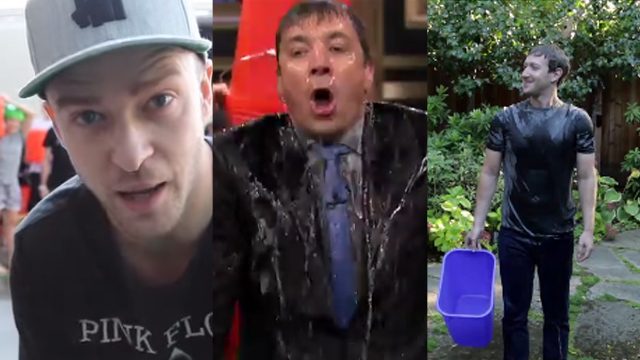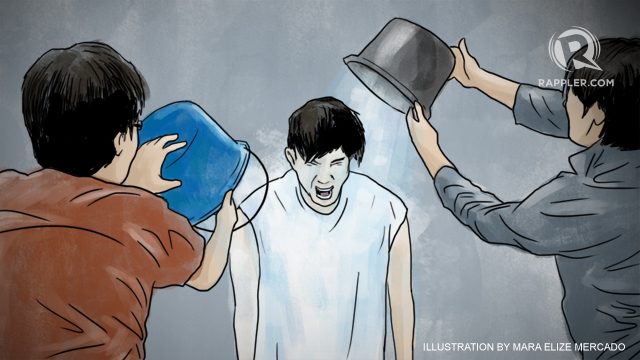SUMMARY
This is AI generated summarization, which may have errors. For context, always refer to the full article.
 I’ve been tagged 12 times now for the ALS Ice Bucket Challenge but a part of me refuses to do it for personal reasons I’d be happy to debate with you. Please, hear me out.
I’ve been tagged 12 times now for the ALS Ice Bucket Challenge but a part of me refuses to do it for personal reasons I’d be happy to debate with you. Please, hear me out.
For the uninitiated, the ALS Ice Bucket Challenge is an online charity campaign seeking disease awareness and financial funding for ALS which stands for Amyotrophic lateral sclerosis – a condition that attacks one’s nerve cells that eventually leads to paralysis.
Patients have a life expectancy of 3 to 5 years once the disease sets in and is characterized by rapid progressive weakness of the body, difficulty in speaking and breathing. The cause of the disease remains to be unknown and this is why research funding is very critical.
Anyone who is called in the ALS Ice Bucket Challenge must pour a bucket of ice water on himself or herself and immediately tag someone else. The tagged person has to do the same challenge in the next 24 hours or forfeit it by means of a charitable donation.
To date, hundreds of ordinary and famous people have joined the movement by posting their challenge videos online.

The ALS Ice Bucket Challenge – a best practice in viral marketing
Firstly, let me clarify and acknowledge the achievements of this viral campaign (and this is regardless if such campaign was about ALS or any other cause about religion or race).
The Ice Bucket Challenge raised more than a whopping US $15 million in just weeks. It also did raise a lot of awareness among the mainstream population (probably even more awareness than the Ebola virus which many people still think is airborne like ordinary flu).
As a marketer, I also fully understand that we need to be creative in today’s times to get people’s attention about diseases, poverty, and war.
I get it – we are all very, very, very busy. We know that it’s very, very, very hard to fight for people’s attention. It’s very, very, very challenging to get space in everyone’s Facebook and Twitter news feeds when there is so much to see on social media (trust me, marketing people like me spend a lot of our company’s money to ensure that you don’t miss seeing our Facebook post promotions about our products).
Why is the ALS Ice Bucket Challenge so special? Because it defied these challenges successfully that it I think it deserves an award from a marketing body. It’s free because its crowd sourced, and it’s done by volition. More importantly, it operates on a very strong and solid consumer insight: if you can’t make people interested about a not so popular disease like ALS (perhaps relative to cancer or AIDS), why not make it more interesting by making people, including celebrities, do something funny and attention-grabbing?
The campaign’s success is no rocket science: it’s quick (most videos last up to one minute), it’s easy to understand (how can you NOT miss the point of laughing at Oprah’s reaction when she shouted like that when doused with ice cold water? ), and it’s catchy (especially when people take off their shirts and show their ripped bodies).
But I also think that this challenge is effective because it is not at all new to us. We’ve done these types of “tag challenges” many times and we love it – ALS or no ALS. More than anything else, tag challenges are simple video “selfies” that are passed on to others. And in today’s world, selfies rule.
So what gives? The easiest critique to throw against this campaign is “slacktivism.” Why throw a bucket of ice water on your head and tweet about it when you can directly donate to the cause?
I won’t even talk about the gallons of water wasted in this campaign while children in other parts of the world are dying to drink clean and safe water. But one can say that the benefits of awareness and funding outweigh whatever critique you’d like to say.
You may call the ALS Ice Bucket challenge as a funny parade of celebrities “humanizing” themselves in public (like gods descending from Mt. Olympus), but it has also effectively moved thousands of people around the world to fight against the disease. Simply put, it is creative marketing with a social cause. It is an exemplary moment of our modern times when we have proven that humanity can use social media for the common good. It also deserves a citation in the next generation of history books.
Sure, many people must have retweeted that abs-baring video of Tom Hiddleston and moved on with their lives without any impact to ALS. But on the bright side, this also made some people encounter the disease for the first time in their lives. Some people even opened up their pockets for charity – and would have not done so if the viral campaign didn’t happen in the first place.
Call it Machiavellian if you must, but the ALS Ice Bucket challenge definitely gained some wins for ALS. I am sincerely happy for all the founders and beneficiaries of the ALS Bucket Challenge and I do wish them the best.
Don’t be selfiesh
But ALS aside, please hear me out on something that I am also genuinely concerned about. Out of the hundreds of ordinary people and celebrities who did the challenge, can you identify how many of them REALLY talked about the disease? Or at least mentioned the website where I can learn more or donate to the cause?
I’m not even going to shame the celebrities if only a handful of them donated (mind you, the rule is that if you don’t do the challenge within 24 hours after getting tagged, you’re only “encouraged” to donate – we reached USD 15 million only because some donated a lot).
Celebrity or not, people poured ice water on their heads because they wanted people to see them pour ice water on their heads. From a marketing perspective, it’s brilliant to use celebrities and friends as a hook to make people know more about ALS but this seems to be working the other way around. It rather seems that ALS is now becoming the convenient excuse to show off yourself in a funny video. Which is the same kick that you get for any selfie.
And sadly, this is what I think the Ice Bucket Challenge has become. People post not for ALS, but for themselves. What do you call a selfish selfie? A selfiesh. And this worries me just as much as the ebola virus or the ongoing killings in the Middle East these days.
For me, this is what the ALS Ice Bucket Challenge really is: “Hey everyone, I’d like you to know about ALS (I don’t have time to talk about it in this short video, or actually I also don’t know anything about it, and yeah maybe I’ll donate after this). But before I do any help, please look at me first and how pretty or funny I will react when I pour this ice bucket, yeah?”
For a different perspective, here’s something to see. In the video below, a young man does the challenge – but later reveals that he himself has been diagnosed with the disease.
“ALS is so, so f*cking scary, you have no idea…That’s probably why nobody talks about it is because it’s so challenging to watch. It’s so challenging to see, to talk about. Nobody wants to see a depressing person that’s dying and has 2 to 5 years to live,” says Anthony Carbajal, who was diagnosed when he was 26.
Glamorous and cool first?
I am worried that we only got people’s attention about ALS after Ben Affleck and Jennifer Garner had their sweet moment at the pool. I get the point of making bitter drugs taste sweeter so children can take them easily, but are we beginning to see an era when the same tactic needs to be applied to promoting social causes?
“I worry that selfies are starting to become the currency of caring, of attention, and of connection. You only feel loved when someone likes your posts… Could this be the future of humanity?”
I am concerned that we are normalizing a behavior in which “the cool” or “the sexy” must first take precedence before action. The last time I checked, so many things in this world – poverty, war, and diseases – will always be uncool, unsexy and ugly that we all have to deal with at the end of the day. In a world when social media makes us more superficial than ever, it seems that we’re starting to only get hooked on causes when they’re as glamorous or controversial as Bieber or the Kardashians.
I am worried that kids these days believe that in exchange for their valuable and most sought-after attention, they feel that they also deserve some attention first. I am terribly frustrated when I see teenagers do the ice bucket challenge for the primary reason of wanting to be seen, more than the cause of spreading awareness for the disease. They think it’s so cool to post themselves in public, and that tagging a friend who’s popular in school will make them look like they’re part of the “in” crowd.
Meanwhile, I cringe. No one seemed to bother to understand ALS. It’s more fun talking about Taylor Swift’s wet shirt than what ALS does to you.
I worry that selfies are starting to become the currency of caring, of attention, and of connection. You only feel loved when someone likes your posts. You only feel validated when someone retweets your thoughts. You only feel important when you impose your presence via videos to the rest of the world. Could this be the future of humanity? I am worried, and I do wish that the ALS Ice Bucket challenge is not the beginning of this. (READ: The tragic implications of digital silence)

What we can really do beyond ice cold water
Some people may think that the ALS Ice Bucket Challenge is a brilliant concept just ruined in execution. Well, maybe it is. But our predisposition to social media has proven many times that viral campaigns are most successful when it’s about us, and not the others.
Here’s my take: if you really want to help out, don’t just throw ice water on yourself. Spend some more seconds talking about the disease and it’s burden. Call people to visit the website of ALS Foundation. Share your opinion why you think it’s important to discuss the disease. Make the challenge more meaningful, and more actionable. Tell people where they can donate or volunteer.
And don’t just do this for ALS, do this for other causes you may be passionate about. Do this for causes that need our utmost help. If you’re not the president of a country who can pass laws to enact changes, education is a giant form of help.
If you do get tagged, you can also do us a big favor before you throw that bucket of ice water on yourself: ask yourself first if you know and understand what ALS is, or whatever cause it is you’re tweeting about. Don’t be selfiesh. Because that’s the least thing that the ALS Ice Bucket Challenge was aspiring for: awareness that the disease exists and that it needs funding.
For those who suffer from the disease where the causes are still unclear, it could be your simplest and easiest gesture of respect that the patients truly deserve. – Rappler.com
To learn more about the movement or the disease called ALS, or to donate, visit alsa.org.
Jonathan Yabut is the winner of the hit reality business TV show, The Apprentice Asia, and was popularly known in the show for his people skills, leadership and passionate speeches in the “boardroom.” He is currently based in Kuala Lumpur as the Chief of Staff of AirAsia reporting to Malaysian business mogul, Tony Fernandes. Apart from work, he engages in motivational talks about youth, leadership and entrepreneurship across Southeast Asia and is represented by the London Speaker Bureau. His book on his journey to becoming the first Asian Apprentice, From Grit to Great, is now available for purchase via jonathanyabut.com
Add a comment
How does this make you feel?
There are no comments yet. Add your comment to start the conversation.